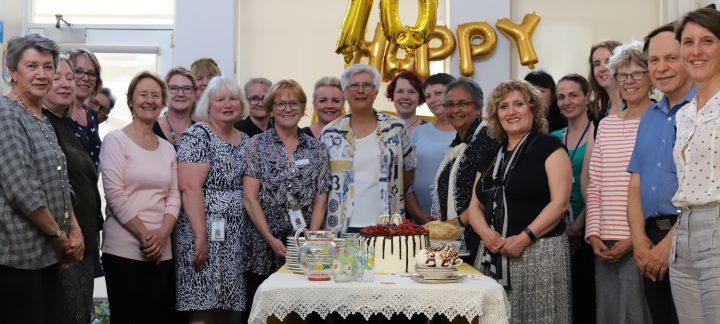Mercy Health actively seeks staff feedback about their work and workplaces. We use the feedback to inform new initiatives and make improvements. One of the ways we seek feedback is through the annual People Matter Survey, which is a statewide survey of public sector employees run by the Victorian Public Sector Commission.
Mercy Health performed strongly on the 2019 People Matter Survey compared to other health services. In terms of satisfaction, Mercy Health performed better than other health services overall (up two per cent). On employee engagement, Mercy Health’s results were broadly on par (down one per cent) compared to other health services. In terms of wellbeing, positive job-related affect (happy and enthusiastic) outweighed negative job-related affect (worried and miserable), with a net score of +44[1] which was on par with other health services. Also an indicator of wellbeing, 20 per cent of Mercy Health’s staff reported job-related stress compared to 21 per cent in other health services.[2]
In the 2019 People Matter Survey, Mercy Health received an overall score of 72 per cent for the patient safety culture questions[3], compared with 70 per cent for other health services. Mercy Health’s responses for the individual questions were:
- 84 per cent agreed that they are encouraged by their colleagues to report any patient safety concerns they may have
- 78 per cent agreed that patient care errors are handled well in their work area
- 74 per cent agreed that their suggestions about patient safety would be acted upon if they expressed them to their manager
- 72 per cent agreed that they would recommend a friend or relative to be treated as a patient here
- 71 per cent agreed that the culture in their work area makes it easy to learn from the errors of others
- 70 per cent agreed that management is driving them to be a safety-centred organisation
- 66 per cent agreed that trainees in their discipline are adequately supervised
- 63 per cent agreed that this health service does a good job of training new and existing staff. In light of this feedback, a 2020 training strategy was developed for non-clinical training, including new initiatives for managers such as a peer learning and discussion forum and ‘Manage@Mercy’, a workshop for new managers.
The aspirational target for each of these questions per the Statement of Priorities 2019/20 is 80 per cent. Based on the 2019 People Matter Survey results, Mercy Health was reaching the aspirational target on one of the eight questions.
One of the key ways Mercy Health is enhancing our patient safety culture is via the implementation of the Speaking up for Safety (SUFS) program.
[1] According to the explanation provided in the 2019 People Matter Survey report, “each respondent is given a score for the question, ‘Over the past three months, how often has work made you feel – (1) miserable; (2) happy; (3) worried; (4) enthusiastic’. A score of 0 for ‘never or very rarely’, 25 for ‘rarely’, 50 for ‘sometimes’, 75 for ‘often’ and 100 for ‘very often or always’ and an average score for each affect was calculated. The net score is the balance of negative and positive affect scores, e.g. positive affect minus negative affect.”
[2] This percentage relates to the number of staff reporting high to severe levels of stress. A lower percentage is a more favourable result.
[3] Response options included strongly agree, agree, neither agree nor disagree, disagree, strongly disagree and don’t know.
Care first: Quality Account 2019/20
Last reviewed February 17, 2021.



